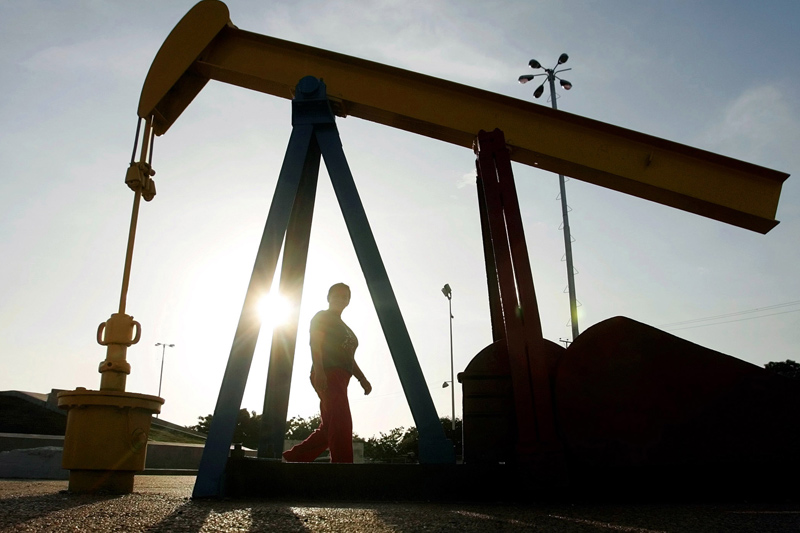Investing.com - Crude oil futures fell in Asian trading on Tuesday, down near a five-month low on fears that Greece may be headed out of the eurozone, as even a relatively clean exit will still drag on overall European growth and crimp energy demand.
On the New York Mercantile Exchange, light, sweet crude futures for delivery in June traded at USD94.28 a barrel, down 0.53%, off from a session high of USD94.36 and up from an earlier session low of USD93.97.
A political stalemate in Greece continues, as political parties remain unwilling to agree on a coalition government, with austerity measures serving as the stumbling block.
Leftist politicians, mainly from left-wing Syriza, refuse to negotiate with their centrist counterparts on naming a coalition government.
Syriza leaders remain staunchly opposed to austerity measures to which the country agreed in exchange for bailout money.
Talk that the stalemate will force a new round of elections is growing, and such an event is seen as a tipping point to Greece's exit from the eurozone, which would crimp oil demand, especially if Spain and Portugal felt pressure to follow suit.
Even a clean exit could curb energy demand as the continent spends less time producing and growing and more time ensuring a reasonably smooth Greek default.
Outside of Greece, the yield on Spanish 10-year bonds shot up to 6.27%, the highest level since December of last year, reflecting growing investor unease over Europe's fate.
Meanwhile, eurozone industrial output dropped 0.3% in March, much worse than expectations for a 0.4% increase.
News out of Asia continues to weigh down the commodity as well.
Late last week, China reported its industrial output climbed 9.3% in April from a year earlier, according to official data, below forecasts for a 12% gain.
Meanwhile, Chinese retail sales rose 14.1%, below market expectations for 15.2% expansion.
Also over the weekend, the People's Bank of China cut by 50 basis points banks' reserve requirement ratio effective May 18.
Concerns that headwinds facing two major global economies, Europe and China, sent oil dropping in Asia early Tuesday.
Supply, meanwhile, remains flush, with Saudi Arabian Oil Minister Ali al-Naimi saying earlier this week the price of Brent crude, the European blend, remains elevated and should dip below $100.
On the ICE Futures Exchange, Brent oil futures for July delivery were up 0.04% and trading at USD110.52 a barrel, up USD16.24 from its U.S. counterpart.
On the New York Mercantile Exchange, light, sweet crude futures for delivery in June traded at USD94.28 a barrel, down 0.53%, off from a session high of USD94.36 and up from an earlier session low of USD93.97.
A political stalemate in Greece continues, as political parties remain unwilling to agree on a coalition government, with austerity measures serving as the stumbling block.
Leftist politicians, mainly from left-wing Syriza, refuse to negotiate with their centrist counterparts on naming a coalition government.
Syriza leaders remain staunchly opposed to austerity measures to which the country agreed in exchange for bailout money.
Talk that the stalemate will force a new round of elections is growing, and such an event is seen as a tipping point to Greece's exit from the eurozone, which would crimp oil demand, especially if Spain and Portugal felt pressure to follow suit.
Even a clean exit could curb energy demand as the continent spends less time producing and growing and more time ensuring a reasonably smooth Greek default.
Outside of Greece, the yield on Spanish 10-year bonds shot up to 6.27%, the highest level since December of last year, reflecting growing investor unease over Europe's fate.
Meanwhile, eurozone industrial output dropped 0.3% in March, much worse than expectations for a 0.4% increase.
News out of Asia continues to weigh down the commodity as well.
Late last week, China reported its industrial output climbed 9.3% in April from a year earlier, according to official data, below forecasts for a 12% gain.
Meanwhile, Chinese retail sales rose 14.1%, below market expectations for 15.2% expansion.
Also over the weekend, the People's Bank of China cut by 50 basis points banks' reserve requirement ratio effective May 18.
Concerns that headwinds facing two major global economies, Europe and China, sent oil dropping in Asia early Tuesday.
Supply, meanwhile, remains flush, with Saudi Arabian Oil Minister Ali al-Naimi saying earlier this week the price of Brent crude, the European blend, remains elevated and should dip below $100.
On the ICE Futures Exchange, Brent oil futures for July delivery were up 0.04% and trading at USD110.52 a barrel, up USD16.24 from its U.S. counterpart.
